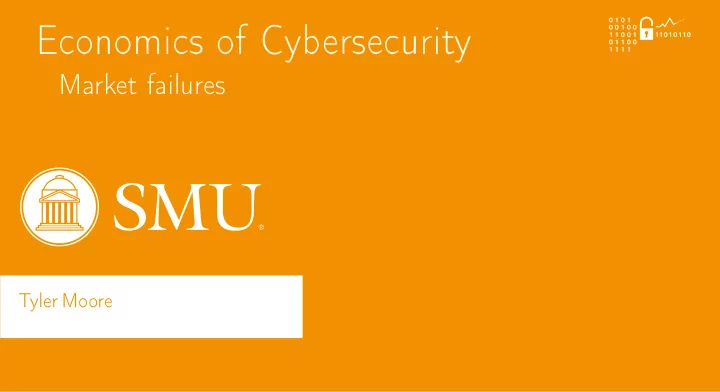

❊❝♦♥♦♠✐❝s ♦❢ ❈②❜❡rs❡❝✉r✐t② Market failures Tyler Moore
When markets fail ◮ Market failures occur when the free-market outcome is inefficient ◮ Monopolies/oligopolies ◮ Public goods ◮ Information asymmetries ◮ Externalities ◮ Market failures justify regulatory intervention, and inform how public policy should be designed ◮ They help explain why private cybersecurity investment is often suboptimal
Public goods ◮ Most goods can be privately consumed (e.g., cars, food) ◮ But somethings can’t be privately consumed (e.g., national defense, grazing commons) ◮ Public goods have two characteristics that make them hard to allocate efficiently ◮ Non-rivalrous : individual consumption does not reduce what’s available to others ◮ Non-excludable : no practical way to exclude people from consuming ◮ Public goods tend to be delivered at less than what is socially optimal
Markets with asymmetric information
Information asymmetries in cybersecurity markets 1. Secure software is a market for lemons ◮ Vendors may believe their software is secure, but buyers have no reason to believe them ◮ So buyers refuse to pay a premium for secure software, and vendors refuse to devote resources to do so
Information asymmetries in cybersecurity markets 1. Secure software is a market for lemons ◮ Vendors may believe their software is secure, but buyers have no reason to believe them ◮ So buyers refuse to pay a premium for secure software, and vendors refuse to devote resources to do so 2. Lack of robust cybersecurity incident data ◮ Unless required by law, most firms choose not to disclose when they have suffered cybersecurity incidents ◮ Thus firms cannot create an accurate a priori estimate of the likelihood of incidents or their cost ◮ Without accurate loss measurements, defensive resources cannot be allocated properly
Consequences of asymmetric information 1. Adverse selection ◮ In health insurance, adverse selection occurs when sick people are more likely to buy coverage than the healthy ◮ Difficulty of discriminating between firms with good or bad operational security practices has hampered the development of the cyber-insurance market
Consequences of asymmetric information 1. Adverse selection ◮ In health insurance, adverse selection occurs when sick people are more likely to buy coverage than the healthy ◮ Difficulty of discriminating between firms with good or bad operational security practices has hampered the development of the cyber-insurance market 2. Moral hazard ◮ People may drive recklessly if fully insured with $0 deductible ◮ Often claimed that consumers engage in moral hazard due to $0 card fraud liability ◮ Cuts both ways: when regulations favor banks, they can behave recklessly in combating fraud
Positive externalities ◮ Positive externality: benefit to third parties as a consequence of another’s actions ◮ Many technical security solutions become effective only when many people aopt them ◮ Introduced in 1996, S-BGP authenticates the paths routers advertise and could have prevented many network outages ◮ However, S-BGP is only valuable if all ISPs switch ◮ Security protocols which have succeeded offer immediate value to adopting firms (e.g., SSH)
Negative externalities
Negative externalities ◮ Negative externality: harm imposed on third parties as a consequence of another’s actions ◮ Environmental pollution is a negative externality ◮ Factory produces a good and gets paid by buyer ◮ Pollution caused by production is not accounted for in the transaction ◮ Information insecurity is often a negative externality
Botnet-infected computers impose negative externalities Source: http://en.wikipedia.org/wiki/File:Botnet.svg
Implications of externalities ◮ When positive externalities are present, less of the good tends to be provisioned than is good for society ◮ When negative externalities are present, more of the bad tends to be provisioned than is good for society ◮ So we often end up with less security investment from the good guys and more harm emanating from the bad guys than we should
Summary ◮ Markets sometimes fail to ensure the best outcomes for society ◮ Cybersecurity failures can often be traced to market failures, notably information asymmetries and externalities ◮ Next time we will learn about available policy options for correcting market failures
Thank you for your attention! Please post any questions you may have on our discussion forum.
Recommend
More recommend